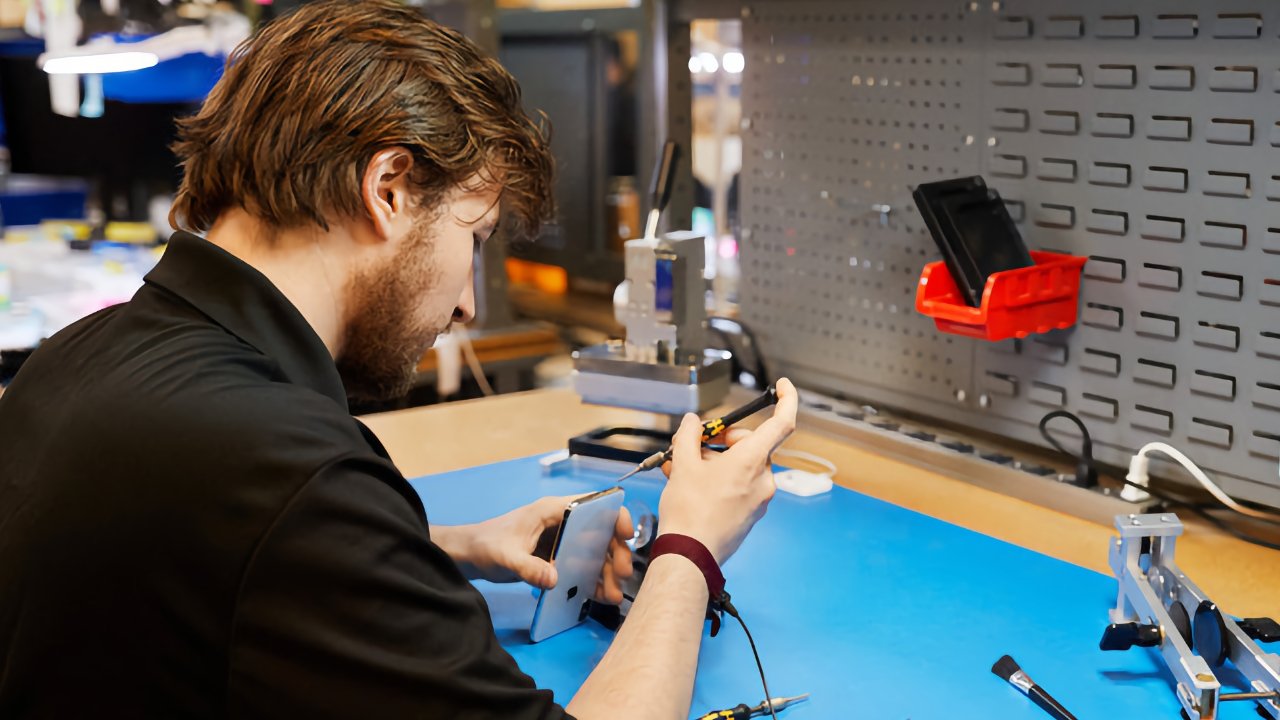Repair shops in Nevada have argued in favor of the state introducing law changes to require 'right to repair,' while technology firms including Apple are lobbying against the effort, citing privacy concerns.
As Apple expands its independent repair provider program, it is still protesting against more general 'right to repair' laws, as are being debated in various states. Nevada's latest hearing saw a trade firm lobbying on behalf of technology firms, while local firms said such a law change would directly help citizens.
According to AP News, assembleywoman Selena Torres has argued in favor of a bill that would apply to consumer electronics retailing at under $5,000. Nevada's bill would exempt gambling equipment.
"Early in the pandemic, a nationwide laptop shortage left millions of students unprepared for virtual learning," said Torres, a Las Vegas English teacher who has previously worked in a repair firm. "As an educator I saw firsthand how families struggled to share one device with several school-aged children."
"The right to repair will give schools and other institutions the information they need to maintain equipment and empower the refurbished computer market, saving taxpayer dollars and improving digital access," she continued.
Apple, Hewlett-Packard, Honeywell and other technology manufacturers were represented at the hearing by Cameron Demetre, regional executive director of lobbying trade group TechNet.
Demetre claimed that the proposed bill had "the potential for troubling unintended consequences, including serious adverse security, privacy and safety risks." He argued that allowing "unvetted third parties" access to devices would put owners' personal information at risk.
Walter Alcorn, lobbyist for the Consumer Electronics Association, also argued against the bill, saying that there would be no way to prevent substandard parts being used in repairs.
"One of the reasons that consumer electronics manufacturers are so sensitive is that their business model is based on their brand reputation," said Alcorn.
"The concern that these companies have in protecting their brands — and these products still carry their names on them — is in particular that the repairs will be done wrong," he continued, "or that substandard parts will be included and the customer experience will be different."
Local businessman Curtis Jones, from the Technology Center in Sparks City, Nevada, told the hearing that his repair business is in danger of closing.
"It's changed from being able to do anything you want to repair your computer or printer, to 'you can't do anything now,'" Jones said. "Everything's changed to being disposable or impossible to repair."
Apple has not directly commented on Nevada's proposals. However, despite its expanding repair program, Apple has internally been divided over the whole issue of 'right to repair.'
Stay on top of all Apple news right from your HomePod. Say, "Hey, Siri, play AppleInsider," and you'll get latest AppleInsider Podcast. Or ask your HomePod mini for "AppleInsider Daily" instead and you'll hear a fast update direct from our news team. And, if you're interested in Apple-centric home automation, say "Hey, Siri, play HomeKit Insider," and you'll be listening to our newest specialized podcast in moments.
 William Gallagher
William Gallagher







-m.jpg)






 Marko Zivkovic
Marko Zivkovic
 Wesley Hilliard
Wesley Hilliard
 Amber Neely
Amber Neely

 Malcolm Owen
Malcolm Owen


 Christine McKee
Christine McKee




-m.jpg)



2 Comments
Complete self-serving hypocrisy. I understand the complaints and the desire to do what you want, but I also understand the companies' wish to protect their own trade secrets, reputation and (in at least one case) consumers' information. You've got to find a balance.
And I would argue that, at least as far as Apple is concerned, Mr Jones should replace "disposable" with "recyclable." I feel sad for him that his repair business has become unprofitable, but change is continuous and activities become obsolete all the time. Maybe he should switch to repairing gambling machines.
I spent a fair amount of time in an Authorised Apple Repair Centre back in the late 90s and early 2000s. Once a machine got past about 4 years old it became difficult to determine whether the most cost-effective approach for the customer was to repair or to buy a new machine. Capabilities were advancing so fast (and that is true with mobile devices today) that repairing or replacing a logic board would be half or more of the cost of a brand new, better machine. Failed hard drive? Easy to get a new, bigger capacity one, but when the OS upgrades cost money it meant an extra labour fee to partition the drive into chunks small enough for System 7 to handle. And while it didn't happen all the time, I came across many machines where the failure of one part ended up foreshadowing failures in other parts within 12 months. Was it worth repairing or replacing the original failed part? I used to agonise over that.
Back then I had PC fanatic friends who were derisive of Apple's "put everything on the motherboard" approach. And in some ways they were right - if you're buying cheap parts, being able to swap them in and out quickly and easily makes it cost effective. But none of my friends counted the time spent on this activity as a cost, because they enjoyed tinkering. Wrangling drivers from some cheaply made Ethernet card into submission was part of the fun and a badge of honour.
Everybody likes to save money on an unavoidable expense, I am no exception. But how many people view servicing their computing device as a worthwhile activity? I hate to raise the car analogy, but servicing your own car is now a hobbyist's pursuit - the equipment, expertise and professionalism required put such an activity beyond the reach or desire of most of the people I know. It's the same with computing devices, especially smartphones. And once you reach the point where most people don't care... well, that's democracy, folks - your favourite activity is not popular any more, so most businesses will view it as less profitable than activities that more people enjoy. And more people enjoy using their devices than people enjoy maintaining them.
Apple's "traditional" computing devices are trending towards a much lower part failure rate than the industry standard, and I think it's reasonable to assume that the same holds true for their mobile devices. While there will always be specific incidents where being able to replace specific components was cheaper in both parts and labour than replacing a larger component or switching to an entirely different machine, this lower overall incidence of failure is an improvement that has value. Being able to walk out of the shop with a different device and be productive again almost immediately has value. Being able to recycle the old parts into raw materials for new machines has value. It's not as easy to quantify that value as it is the cost of replacement parts and labour, but it exists and is meaningful.
Google is an interesting example of this. They deliberately buy computing devices (at one stage they were building their own, I'm not sure if that's still the case) at the lowest possible cost, and they built a structure that handles failure of individual machines. If a machine develops a fault, it gets taken out of active duty and marked for replacement. So at Google's scale, it's definitely more valuable to the company to replace than to repair at the point in time that the failure occurs. Consumers don't operate at that scale, but the computer market as a whole does. So from which frame of reference do we approach this? I'd argue that we use Google's approach, especially when considering government legislation, because government is supposed to look at the bigger picture and take a long-term view.
It absolutely sucks to have a device fail and need to replace it. Eating that cost is not desirable for anyone. But it's cheaper than ever to have your data backed up (on stuff you own or stuff you rent from someone else) and access it from any device anywhere. To me, that's progress and worth the cost of lower machine repairability.